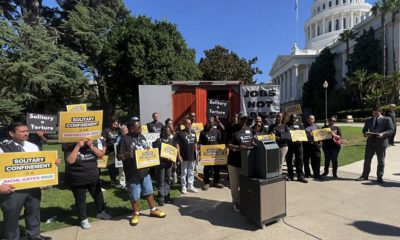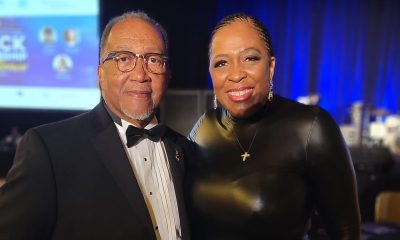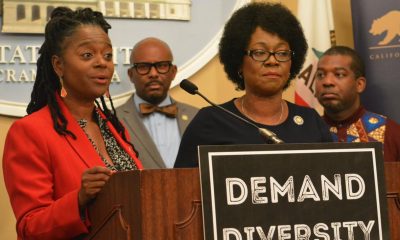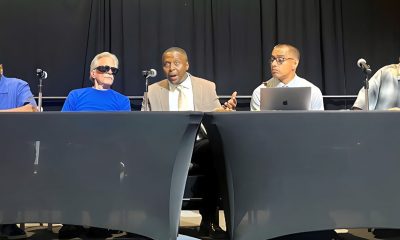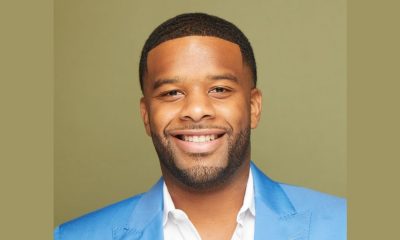Commentary
A New Era of Justice Seekers
NNPA NEWSWIRE — The Anthony Graves Smart Justice Speakers Bureau is the only program of its kind in the nation. The program works with qualified persons to help reduce recidivism and to encourage entrepreneurship and academic development through a 12-week training program, that is taught on the Texas Southern University (TSU) campus.
By Jeffrey L. Boney, NNPA Newswire Political Analyst
Imagine spending nearly two decades in prison for a crime you never committed.
Even worse, imagine spending 12 of those years behind bars on death row.
That is the story of former Texas death row inmate Anthony Graves, whose case garnered international attention after he was wrongfully convicted of multiple homicides in 1992. Graves was sentenced to the death penalty.
Graves’ sentence was overturned in 2006. Then, after having to deal with countless legal loopholes and roadblocks, he was forced to fight and wait another four years in order to be fully exonerated and released from prison in 2010 after 18 ½ long years.
Sadly, stories of false imprisonment and wrongful conviction have impacted countless African Americans for decades — from having to deal with the controversial and inhumane convict-leasing system, to flawed public policy that disproportionately impacts African Americans.
Graves’ case serves as but one example of the complex nuances that make up the America’s controversial criminal justice system.
In 2017, Netflix released a documentary entitled “Time: The Kalief Browder Story.” The film chronicles the tragic case of Kalief Browder, a young Black teenager who spent three years of his young life in pre-trial detention and solitary confinement on New York’s Riker’s Island, without ever being convicted of a crime.
Despite denying the charges, Browder was held because he was on probation for a prior incident. On top of that, because his parents could not afford the money for bail to get him out of jail. Half of Broder’s time in jail was spent in solitary confinement, until 2013 when he was released and all charges against him were dismissed.
Two years after being released, at the age of 22, Browder committed suicide outside of his mother’s home, which led to calls for criminal justice reform in New York.
Stories and incidents like these have prompted activists from across the globe to focus on ways to help bring about comprehensive and effective criminal justice reform in the United States, which is why Graves has chosen to work with the ACLU of Texas and Texas Southern University’s Urban Research and Resource Center (TSUURRC) to launch the Anthony Graves Smart Justice Speaker’s Bureau. Graves said this program was much needed across the country.
“I travel all across the country sharing my story and no matter where I go, I hear story after story about someone who has been impacted by the criminal justice system, whether it was them or someone close to them,” said Graves. “I felt like I had to do something to give these people a voice to share their stories, which I strongly believe will empower them to help bring about changes in the criminal justice system in America.”
The Anthony Graves Smart Justice Speakers Bureau is the only program of its kind in the nation. The program works with qualified persons to help reduce recidivism and to encourage entrepreneurship and academic development through a 12-week training program, that is taught on the Texas Southern University (TSU) campus.
The Anthony Graves Smart Justice Speakers Bureau allows formerly incarcerated people to be trained in professional public speaking and to serve as effective ambassadors related to criminal justice issues.
The program utilizes highly credentialed and experienced trainers who follow approved curriculum specific to the topic areas of criminal justice reform. The class sizes range from 5 to 10 students who are trained and prepared for speaking engagements around the country.
Students who successfully complete the program receive a certificate of achievement certifying their skills.
Selection for training is competitive. Applicants submit a 10-minute video for consideration and/or participate in a phone interview. Afterwards, candidates are then invited to a face-to-face interview.
Speakers are trained to be effective agents of change at the local, state and national levels. Speakers’ skills and time are highly valued. Trained speakers are fairly compensated consistent with speaking fees for other public policy professional engagements.
The TSU Urban Research and Resource Center (TSUURRC) chose to partner with the ACLU of Texas with a goal to help reduce mass incarceration by 50 percent. They hope to do this through researching the key drivers of incarceration and formulating policies aimed at impacting those drivers in a way that achieves the goal.
“This program trains the people who will be most influential in telling the real stories and showing the real faces of the criminal justice system,” said Marcia Johnson, TSU law professor and director of the TSU Urban Research and Resource Center. “The program helps to humanize the people within the system instead of seeing them as numbers. It ensures that we know that these are people not to be forgotten but helped to achieve goals that benefit themselves, their families and society.”
TSU students and faculty conduct research on the issue of criminal justice reform in order to educate communities and policy makers on issues like bail reform, sentencing reform and racial disparities in the criminal justice system.
“When they tell their compelling stories, policy makers get to see the positive differences they could make,” Johnson added. “We do not have the luxury of marginalizing our fellow citizens. We must act humanely if we want to move our nation forward together.”
The Anthony Graves Smart Justice Speakers Bureau program is being administered by TSU journalism professor Serbino Sandifer-Walker, who developed the curriculum for the program.
The program focuses on a range of communication skills and training, which include:
- Effective storytelling and general techniques for effective communication
- Media training and how to effectively communicate with the news media and handle interviews in a variety of different formats
- Delivery of impactful testimony and how to communicate before legislative bodies
- How to communicate to the legal profession and engage with private attorneys, public defenders and the District Attorney’s offices
- Public engagement and generating public support for criminal justice reform by speaking before a general audience
The first seven participants of the Anthony Graves Smart Justice Speakers Bureau recently graduated from the inaugural program and have begun practicing what they have learned by participating in speaking engagements around the country, with one of the first speaking opportunities taking place during the Texas Legislative Session this month.
Having paid their debt to society, previously incarcerated people need and deserve the opportunity to integrate back into civilian life and become positive contributors to society. This program will help these individuals hone and perfect their communication skills, thereby maximizing the impact of their personal testimonies and experiences can have on fostering change in the criminal justice system.
For more information on the Anthony Graves Smart Justice Speakers Bureau, please visit http://urrc.tsu.edu/areas-of-focus/criminal-justice-reform/tsu-anthony-graves-smart-justice-speakers-bureau/.
Jeffrey Boney is a political analyst for the NNPA Newswire and BlackPressUSA.com and the associate editor for the Houston Forward Times newspaper. Jeffrey is an award-winning journalist, dynamic, international speaker, experienced entrepreneur, business development strategist and founder and CEO of the Texas Business Alliance Follow Jeffrey on Twitter @realtalkjunkies.
Commentary
Opinion: Surviving the Earthquake, an Eclipse and “Emil Amok.”
Last Friday, a 4.8 magnitude earthquake shook New York City, reported as the “biggest earthquake with an epicenter in the NYC area since 1884” when a 5.2 quake hit. A bit bigger. The last quake similar to Friday’s was a 4.9 in 1783.Alexander Hamilton felt it — 241 years ago. That’s why New Yorkers were freaking out on Friday. They were in the room where it happens.

By Emil Guillermo
I’m a Northern Californian in New York City for the next few weeks, doing my one-man show, “Emil Amok, Lost NPR Host, Wiley Filipino, Vegan Transdad.”
I must like performing in the wake of Mother Nature.
Last Friday, a 4.8 magnitude earthquake shook New York City, reported as the “biggest earthquake with an epicenter in the NYC area since 1884” when a 5.2 quake hit. A bit bigger. The last quake similar to Friday’s was a 4.9 in 1783.
Alexander Hamilton felt it — 241 years ago.
That’s why New Yorkers were freaking out on Friday. They were in the room where it happens.
And it just doesn’t happen that often.
Beyonce singing country music happens more frequently.
When I felt New York shake last week, it reminded me of a time in a San Francisco TV newsroom when editors fretted about a lack of news an hour before showtime.
Then the office carpeting moved for a good ten seconds, and the news gods gave us our lead story.
On Friday when it happened in NYC, I noticed the lines in the carpeting in my room wiggling. But I thought it was from a raucous hotel worker vacuuming nearby.
I didn’t even think earthquake. In New York?
I just went about my business as if nothing had happened. After living near fault lines all my life, I was taking things for granted.
Considering the age of structures in New York, I should have been even more concerned about falling objects inside (shelves, stuff on walls) and outside buildings (signs, scaffolding), fire hazards from possible gas leaks, and then I should have looked for others on my floor and in the hotel lobby to confirm or aid or tell stories.
Of course, as a Californian who has lived through and covered quakes in the 4 to 6 magnitude range, I tried to calm down any traumatized New Yorker I encountered by taking full responsibility for bringing in the quake from the Bay Area.
I reassured them things would be all right, and then let them know that 4.8s are nothing.
And then I invited them to my consoling post-Earthquake performance of “Emil Amok, Lost NPR Host…”
It was the night of the eclipse.
ECLIPSING THE ECLIPSE
In New York City, the eclipse was about 90 percent visible. Good enough for me. Though a full solar eclipse is a celestial rarity, blockages of any sort aren’t generally celebrated. My one-man play is about growing up with the eclipsed history of American Filipinos and how I struggle to unblock all that.
For example, did you know the first Filipinos actually arrived to what is now California in 1587? That’s 33 years before the Pilgrims arrived in America on the other coast, but few know the Filipino history which has been totally eclipsed.
I was in Battery Park sitting on a bench and there was a sense of community as people all came to look up. A young woman sitting next to me had a filter for a cell phone camera. We began talking and she let me use it. That filter enabled me to take a picture of the main event with my iPhone.
For helping me see, I invited her and her boyfriend to come see my show.
Coincidentally, she was from Plymouth, Massachusetts, near the rock that says the year the Pilgrims landed in 1620.
In my show she learned the truth. The Pilgrims were second.
History unblocked. But it took a solar eclipse.
Next one in 2044? We have a lot more unblocking to do.
If you’re in New York come see my show, Sat. April 13th, 5:20 pm Eastern; Fri. April 19, 8:10 pm Eastern; and Sun. April 21st 5:20 pm Eastern.
You can also livestream the show. Get tickets at www.amok.com/tickets
About the Author
Emil Guillermo is a journalist and commentator. He does a mini-talk show on YouTube.com/@emilamok1. He wishes all his readers a Happy Easter!
Commentary
Commentary: Republican Votes Are Threatening American Democracy
In many ways, it was great that the Iowa Caucuses were on the same day as Martin Luther King Jr. Day. We needed to know the blunt truth. The takeaway message after the Iowa Caucuses where Donald Trump finished more than 30 points in front of Florida Gov. De Santis and former South Carolina Governor Nikki Haley boils down to this: Our democracy is threatened, for real.

By Emil Guillermo
In many ways, it was great that the Iowa Caucuses were on the same day as Martin Luther King Jr. Day.
We needed to know the blunt truth.
The takeaway message after the Iowa Caucuses where Donald Trump finished more than 30 points in front of Florida Gov. De Santis and former South Carolina Governor Nikki Haley boils down to this: Our democracy is threatened, for real.
And to save it will require all hands on deck.
It was strange for Iowans to caucus on MLK day. It had a self-cancelling effect. The day that honored America’s civil rights and anti-discrimination hero was negated by evening.
That’s when one of the least diverse states in the nation let the world know that white Americans absolutely love Donald Trump. No ifs, ands or buts.
No man is above the law? To the majority of his supporters, it seems Trump is.
It’s an anti-democracy loyalty that has spread like a political virus.
No matter what he does, Trump’s their guy. Trump received 51% of caucus-goers votes to beat Florida Gov. Ron DeSantis, who garnered 21.2%, and former South Carolina Gov. Nikki Haley, who got 19.1%.
The Asian flash in the pan Vivek Ramaswamy finished way behind and dropped out. Perhaps to get in the VP line. Don’t count on it.
According to CNN’s entrance polls, when caucus-goers were asked if they were a part of the “MAGA movement,” nearly half — 46% — said yes. More revealing: “Do you think Biden legitimately won in 2020?”
Only 29% said “yes.”
That means an overwhelming 66% said “no,” thus showing the deep roots in Iowa of the “Big Lie,” the belief in a falsehood that Trump was a victim of election theft.
Even more revealing and posing a direct threat to our democracy was the question of whether Trump was fit for the presidency, even if convicted of a crime.
Sixty-five percent said “yes.”
Who says that about anyone of color indicted on 91 criminal felony counts?
Would a BIPOC executive found liable for business fraud in civil court be given a pass?
How about a BIPOC person found liable for sexual assault?
Iowans have debased the phrase, “no man is above the law.” It’s a mindset that would vote in an American dictatorship.
Compare Iowa with voters in Asia last weekend. Taiwan rejected threats from authoritarian Beijing and elected pro-democracy Taiwanese vice president Lai Ching-te as its new president.
Meanwhile, in our country, which supposedly knows a thing or two about democracy, the Iowa caucuses show how Americans feel about authoritarianism.
Some Americans actually like it even more than the Constitution allows.
About the Author
Emil Guillermo is a journalist and commentator. He does a mini-talk show on YouTube.com/@emilamok1.
Activism
Oakland Post: Week of April 10 – 16, 2024
The printed Weekly Edition of the Oakland Post: Week of April 10 – 16, 2024

To enlarge your view of this issue, use the slider, magnifying glass icon or full page icon in the lower right corner of the browser window. ![]()
-

 Activism4 weeks ago
Activism4 weeks agoOakland Post: Week of March 20 – 26, 2024
-

 #NNPA BlackPress3 weeks ago
#NNPA BlackPress3 weeks agoCOMMENTARY: D.C. Crime Bill Fails to Address Root Causes of Violence and Incarceration
-

 #NNPA BlackPress3 weeks ago
#NNPA BlackPress3 weeks agoMayor, City Council President React to May 31 Closing of Birmingham-Southern College
-

 #NNPA BlackPress3 weeks ago
#NNPA BlackPress3 weeks agoFrom Raids to Revelations: The Dark Turn in Sean ‘Diddy’ Combs’ Saga
-

 #NNPA BlackPress3 weeks ago
#NNPA BlackPress3 weeks agoCOMMENTARY: Lady Day and The Lights!
-

 #NNPA BlackPress3 weeks ago
#NNPA BlackPress3 weeks agoBaltimore Key Bridge Catastrophe: A City’s Heartbreak and a Nation’s Alarm
-

 #NNPA BlackPress3 weeks ago
#NNPA BlackPress3 weeks agoBaltimore’s Key Bridge Struck by Ship, Collapses into Water
-

 Activism3 weeks ago
Activism3 weeks agoOakland Post: Week of March 27 – April 2, 2024



